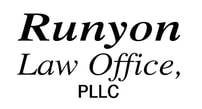Joint Tenancies Redux
But let's say we're willing to risk the double catastrophe. Are there any other drawbacks to putting our children, for example, on as joint owners of our accounts or real estate, so they take over effortlessly once we're gone? Well, yes, actually, or I wouldn't be wasting your time here.
When we put another name on the titles to our assets, we see it as simply a convenient probate work-around. The trouble is, the law views it differently - that is, as a gift of a partial interest in the respective asset. So, if we put a child's name on as joint owner of a bank account or of the title to our home, the presumption is that they now own as much of it as we do. Legally, that also means their part interest is subject to all the vagaries of their [perhaps] tumultuous lives, even though ours may be pretty sedentary at this point. While we're patting ourselves on the back for our shrewdness, our children may be getting sued over a bad car loan, credit card balance or medical bill - perhaps even to the point of bankruptcy - or they may be splitting with their spouses. All those events put their share of our assets at risk for the benefit of people and creditors we had no plan to benefit.
The other risk - and I hesitate even to breathe a word of it because who would do such a thing? - is that joint owners of our accounts have access to those funds - and I mean all of the funds - for their own purposes. Oh, I'm not suggesting they're really out to rip us off like one of those phone scam artists; they may just need an advance on their rent or oil delivery and will repay it as soon as their next paycheck arrives. Only there are other bills due then, and somehow the account never gets replenished. It's a bad cycle and it tends to repeat itself, even if there's no malice involved.
So, what do we do instead? Some banks and brokerage firms will let us name beneficiaries on our accounts, so they go to our beneficiaries - as with life insurance and IRAs - again without probate, when we pass on. In the meantime, we remain the sole owner of our financial assets - and can get a good night's sleep. Another way, of course - and you should know this by now if you've been reading here for any time at all - is to set up a revocable trust, with yourself as the trustee, and title your assets there. That will still provide the probate avoidance magic, and at least as long as you're around, your family members will deal with their life challenges without tangling up your stuff in the process. If and when you really do need help from someone to handle those increasingly baffling financial affairs, you can add the offspring as co- or successor trustees - or maybe just designate them as signatories on the accounts - then make sure to ask for your own copies of all the bank and investment statements.
I'm sorry if I've impugned the integrity of anyone's young folks with my alarmist comments. It's just that it's a financial minefield out there for many of our offspring, with stressful decisions facing them every month. We want to help them whenever we can, but we want to do it on our own terms - and not to unwittingly expose our assets to risks we thought we had weathered years ago. You offspring should be listening, too: Don't let your elders' hard-earned resources be put in unwitting jeopardy for your obligations - ones that you can probably work through on your own - or there may not be a need to worry about probating anything later on.
Posted 08/12/2014
